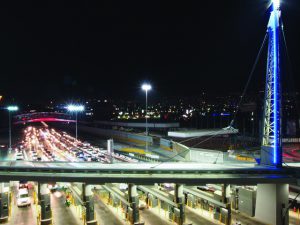The fight against terrorism in the U.S. has caused heightened security protocols at ports of entry, leading to complaints by hundreds of border crossers.
U.S. Customs and Border Protection is adapting its regulations to keep up with technology changes, from officers checking visitors’ computer content beginning 5 years ago, to the recent checks of other electronic devices such as cell phones, CDs, multimedia players, cameras, as well as any other that may pique their interest.
Immigrant advocacy groups, such as American Friends Committee in San Diego, tell us that the fact that cell phones have so many applications now makes phones practically computers, meaning border crossers are subject to having them checked for security purposes.
Border crossers constantly express their discontent, as these thousands of people already have to endure long lines, and now in addition are being required to hand over personal devices with thousands of characters and images they feel are valuable, private information.
“It’s an invasion of privacy. It shouldn’t be that way, but unfortunately people don’t have any recourse against these things. They are forced to do it, and there’s nothing you can do; I’d like to talk to the officers, to the politicians, send letter or something, but it usually falls on deaf ears,” said Horacio Escorcia, a local citizen, while waiting to cross into San Diego at the San Ysidro Port of Entry.
Longer wait times caused by checking these devices without at least sending the person to secondary inspection are another concern caused by this measure.
“I have nothing to hide, but they’re going to make it take longer [to cross]. We got here since 7 a.m. and it’s already 9 a.m.,” shared Carlos Arana, a border crosser at the San Ysidro Port of Entry. “I heard about these changes last night and I said ‘let’s go early, otherwise the line is going to be very long,’ but we’ve already been here two hours and we still haven’t crossed. That does worry me,” said Carlos Arana, a San Ysidro POE border crosser.
The American Friends Committee has already received a complaint regarding this issue: a gentleman who is a frequent border crosser went up to the CBP Officer at the pedestrian port of entry, and the officer proceeded to ask to see his cell phone.
“When he got to the booth, the officer asked for the cell phone, and started checking it. The gentleman found this strange. He was not sent to secondary, as it happens when they detect something unusual about a person. They just asked for his cell phone and he handed it over, but he did find it weird,” said Pedro Rios, Director of the American Friends Committee in San Diego.
ELECTRONIC DEVICE CHECKS
U.S. Customs and Border Protection (CBP) clarified that no Fourth Amendment Rights are being violated by these provisions, since officers are empowered within the “international zone” to check electronic devices as part of their routine checks. There are specific protocols in place for checking, and seizing, devices.
“You may be subject to inspection for a variety of reasons, including having incomplete travel documents or lacking the proper visas, having previously violated one of CBP’s laws, having a name that matches that of a person of interest, or simply being selected for a random search,” states Customs and Border Protection in their section regarding inspection of electronic devices.
When a device or cell phone is detained by CBP officer, the owner is given form 6051-D, which includes a written receipt and requests a phone number to contact the owner to – in theory – return his/her property.
If the Agency determines that the device is subject to seizure due to its containing evidence of a crime, prohibited-item contraband, or valuable information, the owner is notified of such seizure, and fines and/or sanction against the person are determined.
CBP indicated they are aware of the complaints and discontent due to potentially longer wait times, and responded they must remain vigilant as to who is allowed to enter the country in order to keep terrorists, weapons, controlled substances, and a wide array of prohibited or restricted items out of the country, and electronic devices brought by travelers who seek to enter are also a tool for their detection.
